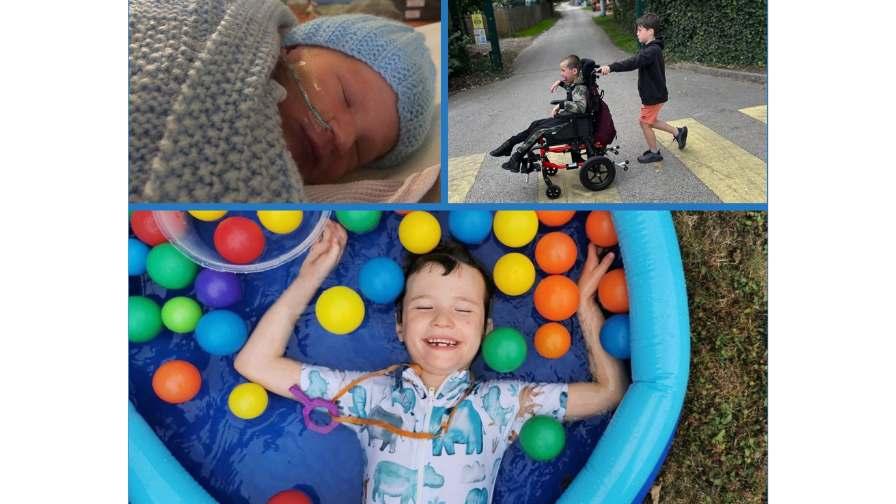Children’s charity Action Medical Research is funding research which aims to develop a new diagnostic tool that allows screening of newborn babies for cytomegalovirus (CMV). In the UK, an estimated one in 300 each year are born with congenital CMV and most will not have any symptoms at birth but problems could appear months or years later.1,2 Around one in five babies born with CMV will have permanent disabilities as a result of this infection.1,3 This includes seizures (fits), hearing problems, problems with the eyes, and problems with the liver and spleen or more rarely developmental or learning difficulties.1,4 Early detection of CMV and prompt treatment is essential to help improve outcomes and reduce the risk of permanent disabilities.
When Mylo was born, a routine scan showed that he had excess fluid on his brain, but the cause was unknown. After a few days in the neonatal unit to regulate his temperature and blood sugars, he was discharged. However within a few days he had failed his newborn hearing test and a few months later he was missing major milestones. Mylo’s mother Ruth explains: “Mylo was diagnosed with congenital CMV when he was three months old. Even though he was prescribed antiviral drugs, as time passed it became apparent that the virus had caused brain damage. Mylo is profoundly deaf in one ear, with milder hearing loss in the other. He has visual impairment, very limited mobility and is completely non-verbal – he can only communicate by crying and laughing. If Mylo had been diagnosed at birth, he could have had immediate treatment which might have been more successful.”

Antiviral treatment should ideally be administered within the first six weeks to maximise the effect. However as there is no routine screening programme for CMV, treatment often occurs when problems are diagnosed. With the help of funding from Action Medical Research, a research team at Swansea University are developing a low-cost device to test babies at birth. Professor Vincent Teng from Swansea University comments: “Existing methods for detecting CMV are costly and time-consuming and can only be performed in a laboratory using specialist equipment. Our aim is to develop a low-cost, highly sensitive and easy-to-use point-of-care diagnostic device, which could be used to screen for CMV in newborn babies and provide rapid results.”
Existing methods for detecting CMV are unsuitable for large-scale screening as they are costly, time consuming and can only be performed in a laboratory using specialist equipment. The researchers are planning to create a much simpler test that can provide rapid results. “We will initially test our device to find out whether it can accurately detect and measure CMV directly in clinical samples from newborn babies,” says Professor Teng. “The team will then compare the performance of their device against the current gold standard diagnostic test – to demonstrate the feasibility of using it as a screening tool for CMV infection in the future.”
“Mylo is the light of our life, but caring for a child with his needs is not easy by any stretch of the imagination. Had we known at birth that Mylo had CMV, he could have been treated immediately,” says Ruth. “We were told that ideally treatment should be administered within six weeks to maximise the effect. That Mylo has been affected so severely is still a hard pill to swallow.”
Action Medical Research are pioneers in funding innovative early research which has paved the way for new treatments and diagnostic tests. Dr Caroline Johnston, Senior Research Manager, Action Medical Research: “Action Medical Research has been funding medical breakthroughs for over 70 years. The research we have funded has helped to beat polio, prevent stillbirths and develop ultrasound scanning in pregnancy. The results of this research could be a significant breakthrough in diagnosing CMV in newborn babies and potentially avoiding the risk of long-term disabilities.”
Discover more about CMV and the research funded by Action: www.action.org.uk/CMV.
References
1. Tommy’s. Cytomegalovirus and pregnancy. Available at: www.tommys.org/pregnancy-information/pregnancy-complications/cytomegalovirus-and-pregnancy. Accessed June 2024.
2. Vital statistics in the UK: births, deaths and marriages. Office for National Statistics. Available at Vital statistics in the UK: births, deaths and marriages - Office for National Statistics (ons.gov.uk). Accessed June 2024.
3. Townsend et al, 2013. Long-term outcomes of congenital cytomegalovirus infection in Sweden and the United Kingdom. Available at: Long-term outcomes of congenital cytomegalovirus infection in Sweden and the United Kingdom - PubMed (nih.gov). Accessed June 2024.
4. Action Medical Research. Developing a diagnostic device that could be used to screen newborn babies for an infection that can cause long-term health problems | Action Medical Research. Accessed June 2024.
